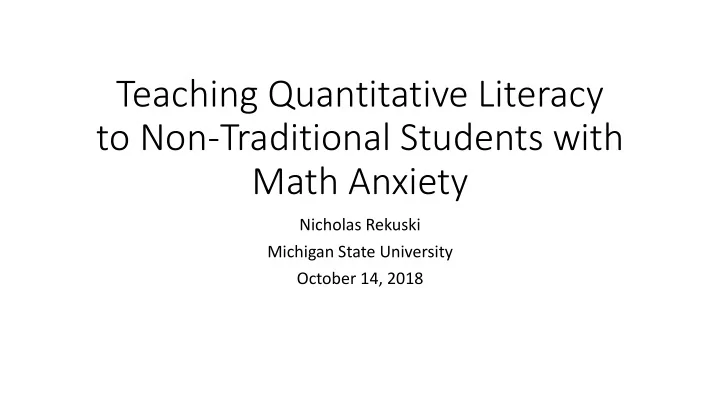

Teaching Quantitative Literacy to Non-Traditional Students with Math Anxiety Nicholas Rekuski Michigan State University October 14, 2018
Setting the Scene • For this talk, when I say non-traditional student I mean a student over the age of 25 (this is different than the NCES’s definition).
Setting the Scene: Math Anxiety Quotes from Traditional Students Quotes from Non-Traditional Students • “Math is not a creative subject.” • “My spouse is the one that deals with money.” • “I am a right - brained thinker.” • “I would never ____ in the • “Getting stuck is the same as being workplace, so I don’t know why I stupid.” should learn this.” • “Being fast means I am smart.” • Do group work, use excel, make • “Only geniuses can understand graphs, etc. • “I already know my opinion on math.” issues that matter, so I do not need • “Math is memorization.” to read articles.”
Setting the Scene: Math Anxiety
What MSU was Already Doing • New course materials created in Spring 2018 with a significant portion of the class to consist of labs (both in time and grade weight). • The labs included: • Computing a Course Grade • Probability of Unplanned Pregnancies and False Positives. • Creating a Country Happiness Index • Analyzing Data Visualizations • Most labs started with a free-write and had a reflection due later. • Nick piloted the new materials in Summer 2018.
What MSU was Already Doing: Student Response • “Why are we using Excel in a math class, and why are we working in groups? This would never happen at my work.” • Groups with members who had the above sentiment were off-track and complaining. • I addressed the comments, but students in these groups remained unhappy. • Bad attitudes spreading through class and a bad classroom culture.
What MSU was Already Doing: Turning Point • Working on probability lab about unplanned pregnancies and medical testing results. • “Condoms are 99.99% effective, so this doesn’t make sense.” • “Why do you insist on making up these words just to confuse us?” (In the context of true positives, false negatives) • Students seemed to think that I was making up context for the class.
What have People Already Done? • SERC • Henrich and Lee • Repetition and scaffolding • Service learning (tutoring students at nearby elementary and middle • Teach heuristics schools in math) • Fun, exciting, and engaging • Reflective writing on tutoring classroom culture. • Reading Assignments • AIBL • Ricchezza and Vacher • Starter problems • Reading Assignment on Keith • Coaching (scaffolding) Devlin’s The Math Instinct • Active learning environments • Reflective writing on reading • Reading assignments and reflective writings
What I Decided to Do 1. Give video lectures as part of homework 2. Allow students more independence in choosing the context of the lab 3. For the future: Plan on labs to depend on each other.
What I Decided to Do: Lecture Response • “He tends to teach for long periods to time…” • “[I am] …struggling due to the lack of information that was given during lecture.” • “[the lecture material] …is not university level.”
What I Decided to Do: Contextual Independence Response
What I Decided to Do: Contextual Independence Response
What I Decided to Do: Contextual Independence Response • https://www.nytimes.com/interactive/2018/03/19/upshot/race- class-white-and-black-men.html
What I Decided to Do: Contextual Independence Response • “This was very interesting! Gender inequality is scathingly obvious in these graphs....how sad. Me & my spouse had a good conversation heavily related to this article & the previous one about boys. He watched a program on Netflix called “Explained”. The first episode was about the racial wealth gap. Entire thing supported these articles, and what I was talking about regarding the “deep well” of multigenerational wealth among white men. The wealth gap stats are terrible.”
What I Decided to Do: Contextual Independence Response • “You could probably tell I was not excited to be here, but in the end I found it kind of interesting.” • “I never knew there was so much to be said about graphs, and there is even a job where you just make graphs. I have been thinking about switching majors.”
Weird Side note from Talking with Students • When interviewing my past non-traditional students, many of them found anecdotes to be what they remember most from class. • “Geography majors from North Carolina, on average, make more than geography majors from any other school.”
Questions from Me • How can we make sure that ULAs will understand the context enough to be able to lead labs. • What other resources are out there for working with “extreme math anxiety?” • What are other peoples’ experience working with non -traditional students? • How can we assure that there is sufficient scaffolding on a lab, but enough contextual freedom?
Thank You!
Recommend
More recommend